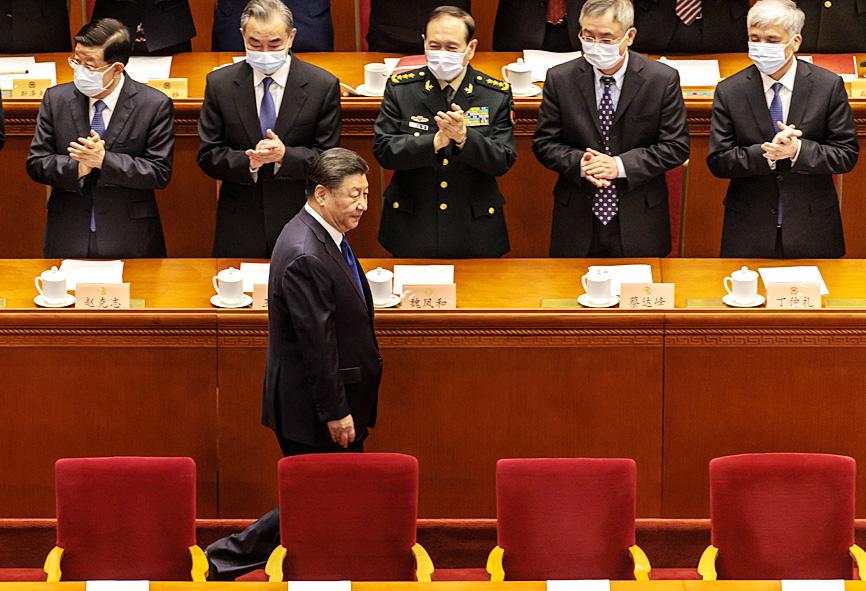Leaders of China’s provinces have less job security than at any time in the past four decades, a sign of the upheaval caused by Chinese President Xi Jinping’s (習近平) anti-corruption campaign.
The Chinese Communist Party’s provincial heads stayed in the job just 1.6 years on average last year, according to data compiled by Cheng Li (鄭立), director of the John L. Thornton China Center at the Brookings Institution, a US research organization.
That was the shortest average duration for a post that carries a five-year term in Li’s data going back to 1985, when party bosses held their jobs for 4.5 years.

Photo: EPA-EFE
Tenures have been dropping for decades, but the phenomenon has sped up amid Xi’s curbs on graft, Li wrote in an article.
That campaign to clean up the government of the world’s No. 2 economy has had the added benefit of removing potential political rivals as Xi prepares to secure a precedent-defying third term in office at a twice-a-decade leadership congress later this year. Lower officials around the nation are also likely to be jockeying for promotions before that event.
Xi signaled in 2013, shortly after taking power, that he would not spare any dirty official, and millions of cadres at all levels of government have been busted. One of the earliest victims of the anti-corruption purge was former Chinese security boss Zhou Yongkang (周永康), who had been one of the nine most senior politicians in China. He was sent to prison for life for bribery, abuse of power and leaking state secrets — a takedown that smashed taboos about who was untouchable in elite Chinese politics.
Xi has kept up the pressure on Chinese officials since then. Last year, former Chinese deputy minister of public security Sun Lijun (孫力軍) was expelled from the party for “cultivating personal power and forming an interest group,” a sign that Xi remains keen to tame rivals.
Li also wrote that mayors and governors, who answer to provincial party bosses, also face greater turnover in their roles. They lasted just 0.8 years in office last year, down from 2.5 in 1985, according to his March 27 article, which used sources including the Web site of Xinhua news agency.

Philippine President Ferdinand Marcos Jr has fired his national police chief, who gained attention for leading the separate arrests of former Philippine president Rodrigo Duterte on orders of the International Criminal Court and televangelist Apollo Carreon Quiboloy, who is on the FBI’s most-wanted list for alleged child sex trafficking. Philippine Executive Secretary Lucas Bersamin did not cite a reason for the removal of General Nicolas Torre as head of the 232,000-member national police force, a position he was appointed to by Marcos in May and which he would have held until 2027. He was replaced by another senior police general, Jose

ANGER: Unrest worsened after a taxi driver was killed by a police vehicle on Thursday, as protesters set alight government buildings across the nation Protests worsened overnight across major cities of Indonesia, far beyond the capital, Jakarta, as demonstrators defied Indonesian President Prabowo Subianto’s call for calm. The most serious unrest was seen in the eastern city of Makassar, while protests also unfolded in Bandung, Surabaya, Solo and Yogyakarta. By yesterday morning, crowds had dispersed in Jakarta. Troops patrolled the streets with tactical vehicles and helped civilians clear trash, although smoke was still rising in various protest sites. Three people died and five were injured in Makassar when protesters set fire to the regional parliament building during a plenary session on Friday evening, according to

STILL AFLOAT: Satellite images show that a Chinese ship damaged in a collision earlier this month was under repair on Hainan, but Beijing has not commented on the incident Australia, Canada and the Philippines on Wednesday deployed three warships and aircraft for drills against simulated aerial threats off a disputed South China Sea shoal where Chinese forces have used risky maneuvers to try to drive away Manila’s aircraft and ships. The Philippine military said the naval drills east of Scarborough Shoal (Huangyan Island, 黃岩島) were concluded safely, and it did not mention any encounter with China’s coast guard, navy or suspected militia ships, which have been closely guarding the uninhabited fishing atoll off northwestern Philippines for years. Chinese officials did not immediately issue any comment on the naval drills, but they

POWER CONFLICT: The US president threatened to deploy National Guards in Baltimore. US media reports said he is also planning to station troops in Chicago US President Donald Trump on Sunday threatened to deploy National Guard troops to yet another Democratic stronghold, the Maryland city of Baltimore, as he seeks to expand his crackdown on crime and immigration. The Republican’s latest online rant about an “out of control, crime-ridden” city comes as Democratic state leaders — including Maryland Governor Wes Moore — line up to berate Trump on a high-profile political stage. Trump this month deployed the National Guard to the streets of Washington, in a widely criticized show of force the president said amounts to a federal takeover of US capital policing. The Guard began carrying